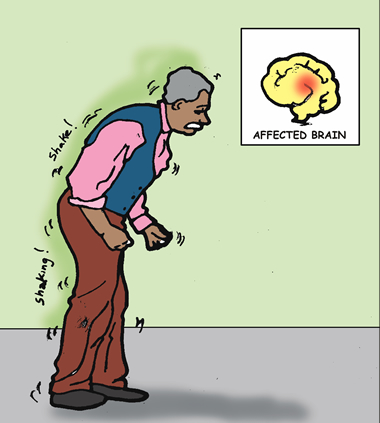am a slow walker but I never walk backwards. Those who walk with God ALWAYS reach their destination.”- Unknown
When I first began having symptoms of PD I was falling often because I was tripping on my left foot which would get stuck on the floor rather than continue stride – more often while initiating stride. Over the years my symptoms improved with treatments both medical and ancillary. However, at each progression of disease stage there is always a tendency to have more difficulty ambulating particularly in small confines.
Freezing is a condition seen in Parkinson’s disease which in my experience can involve one or both lower limbs. The degree of freezing worsens over time as disease progresses. However, the pattern of gait is changed from the early onset of disease this is why so many of us fall and trip on our feet early on in the disease. This by far has been one of the most difficult things to treat with an estimated 30% of individuals with PD having significant difficult with this. However, I think that part of the reason for this inability to treat is poor understanding of what is going on mechanically as well as sensory- visual.
Freezing which is described as inability to pick up the feet making them feel like they are stuck to the ground. It occurs more often at the initiation of gait especially when arising from a sitting position worse if you have been sitting for prolonged periods of time in a tight space or low chair in my experience. Also occurs early morning with – morning offs and when medicine is wearing off.
Risk factors for developing freezing of gait are absence of tremor (early on in the disease) and PD beginning as a gait disorder. The development of freezing of gait in the course of the illness is strongly associated with the development of balance and speech problems, less so with the worsening of bradykinesia, and is not associated with the progression of rigidity. Less likely to have this problem if you are tremor dominant.
Triggers for freezing are usually visual in nature in my opinion and in my personal experience- they present more commonly in dim places, crowed halls or rooms, when there is a sudden change in direction especially in corners but when there is a contrast problem in visual perception that obscures exact depth of walk ways it tends to cause freezing and hesitation because I believe our brain is trying to decide whether is safe to walk or not. Really trying to avoid falling. However, because we are slow and also have shift in gravity forward our bodies are not often able to compensate or adjust readily to this new data input from our brain causing us to fall.
Some of the things that are associated with freezing or that appear to worsen this phenomena is anxiety- which in my experience is seen when medication is off or poorly controlled motor symptoms which stand to reason that if our motor function is less than optimal we will not be able to ambulate optimally.
Each time I have fallen in the past few months has been an indicator of need to adjust medications. Each time with increase levodopa dose my symptoms have improved.
However, for reasons unknown Mao inhibitors such as eldepryl, depranyl, zelpar, azilect are particularly good at improving balance – I personally believe that each patient particularly when levodopa adjustment is not sufficient to prevent freezing should use these medications. Interestingly – in my experience these medicines especially azilect are quite good at improving visual deficits and problems with contrast which reaffirms to me at least at some degree that visual sensory loss has lots to do with freezing. The new medication xadago which is also mao inhibitor in part did not seem in my case help with this issues I was on for a month at maximum dose – perhaps over longer period of time this would help. But the other maoi’s in my experience have had direct benefit on visual problems and freezing gait within a week of initiating. Interestingly, there was a small study that indicated that Aricept is another good drug for treatment of gait freezing – since this drug directly improves not just motor executive function but also how sensory information is processed in the brain it would make sense that improvement in visual information processing would improve gait issues.
How do we treat?
The main thing is to first discover whether this pattern of walking or lack thereof is related to an “off” state and time of day. Is there anxiety at the time? Is it happening at night or poorly dimmed corridors, hallways or crowed areas? Does it happen after sitting long time or when arising from cramped conditions like being on a plane long time or sitting on a low chair couch?
Make sure that home is well lit, hallways and corridors are wide, remove carpets which can cause friction, make sure vision is corrected, build open spaces in your home, get chairs that can lift up when sitting, stand for a few seconds before initiating walk. Use assistive devices when needed, try not to sit for long periods of time without moving/stretching, and adjust medications frequently! Engage in PT, OT, exercises for balance such as yoga, tai-chi, walking on sand and deep water exercises.
I guarantee that if we follow these rules our freezing gaits will certainly improve. Avoid shoes with traction.
Sources:
http://movementdisorders.ufhealth.org/2011/11/23/physical-therapy-tips-for-freezing-of-gait/
http://www.epda.eu.com/en/parkinsons/in-depth/pdsymptoms/freezing/
Freezing of gait in PDN. Giladi, M. P. McDermott, S. Fahn, S. Przedborski, J. Jankovic, M. Stern, C. Tanner, The Parkinson Study Group Neurology Jun 2001, 56 (12) 1712-1721; DOI: 10.1212/WNL.56.12.1712

@copyright2019
all rights reserved by Maria De Leon MD

Ability to manage dual-tasks effectively greatly helps defeat freezing as well. Ensure that you’re working with a PD- and Neuro- specialized Physical Therapist who can work with you to optimally manage your freezing. Here are a few links to articles to better understand this phenomenon https://downloads.hindawi.com/journals/pd/2012/459321.pdf. https://core.ac.uk/download/pdf/34475777.pdf. https://academic.oup.com/ptj/article/89/4/384/2737637
thank you Betsaida…big hug